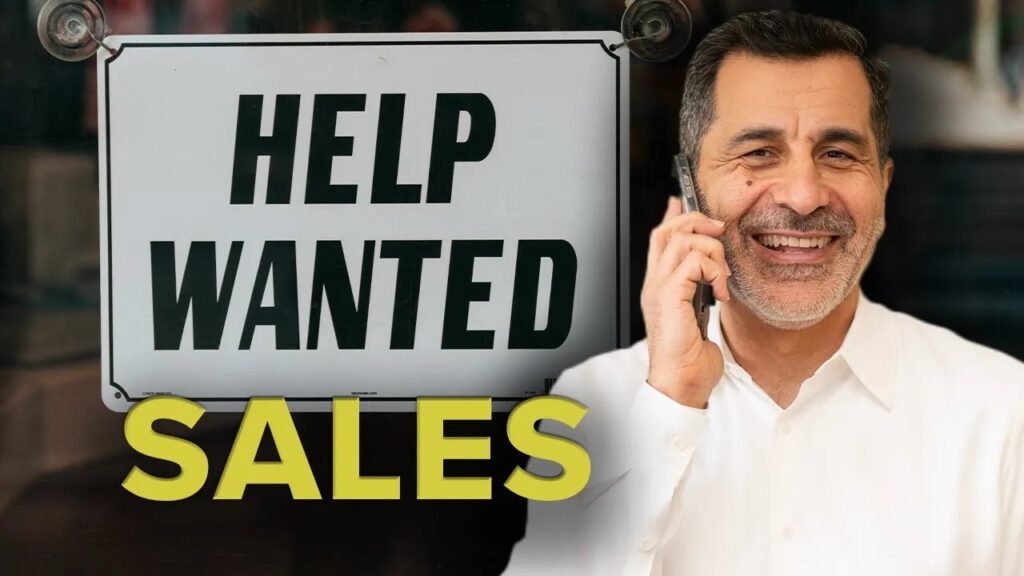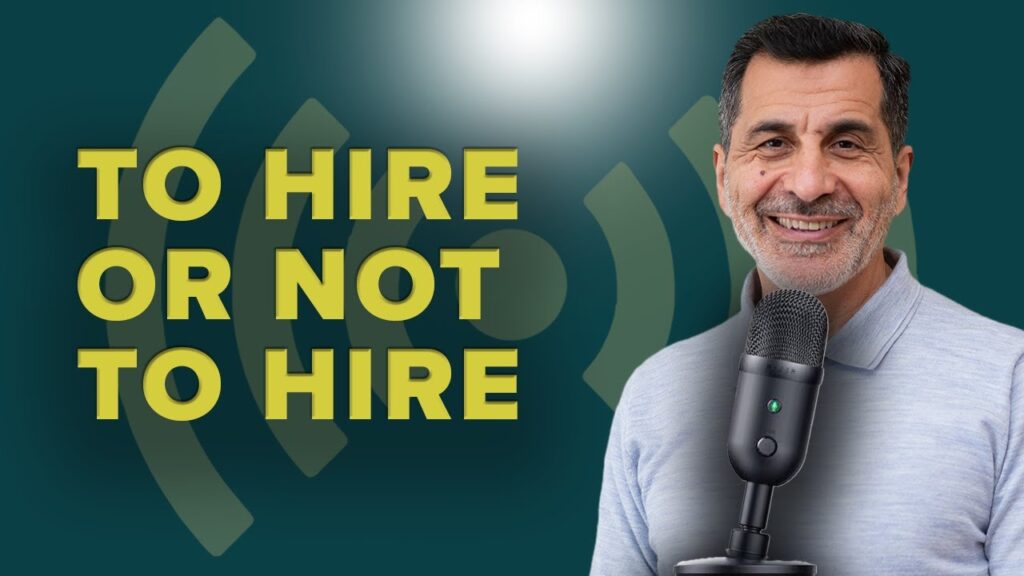3 Rules to Help You Determine When to Hire a Salesperson

“People are not your most important asset. The right people are.”
— Jim Collins, consultant, researcher, and author of Good to Great: Why Some Companies Make the Leap… and Others Don’t
In the life of every founder, there comes a time when you have to make a tough call:
Should you hire a salesperson? Or should you just hire someone to help with sales? Or do you tough it out and keep hustling on the sales front yourself?
Your first hire for any position is a difficult and important decision. You’re making a choice to grow beyond yourself and add people to the payroll who you are in charge of and have to manage. It’s a big step.
The hiring dilemma often hits you after trying to juggle running the business, marketing, selling, and delivering projects all at once. It gets exhausting. Keeping those leads interested enough to seal the deal becomes a struggle.
So, here I’m laying out three simple guidelines to help you determine if it’s time to hire a rep for your startup or if you should stick to doing the sales yourself.
These guidelines came in handy for Tony. A founder hustling in the project management consulting game, Tony had leads and some customers, but closing deals was a challenge. His sales pipeline wasn’t dry, but moving leads closer to signing contracts was a slow burn.
Tony asked, “Should I hire one now, or should I keep handling sales myself?”
Now, this was far from the first time a startup founder had asked me this question. Many founders hit this same fork in the road at some point in their business journey.
3 Guidelines to Help Startups Decide When to Hire Their First Salesperson
I shared with Tony that making that first hire depends on three key factors:
1. Can You Afford to Hire a Sales Person?
First off — surprise, surprise — it’s all about the budget. Ask yourself: Do you have enough cash stashed away for this? Hiring a top-notch sales rep doesn’t come cheap.
There’s no shortage of advice at what revenue you should hire that first rep, much of it conflicting. But in this day and age, the traditional 9-to-5 full-time salesperson with all the perks and benefits is not the only option. The gig economy gives you and your hire more freedom to define the role, starting from a part-time, as-needed basis, all the way up to a virtual sales manager through a service like Fiverr or Upwork. So if a full-time salary is a bit much for your budget, consider going part-time or opting for a commission-only arrangement.
But how much can you afford? It depends on you, your sales effectiveness, and your time availability. Here are steps you can take to check affordability before you hire your first salesperson:
- Track your time. Start by tracking the time you spend on all related sales-activities. Use a web app like Toggl or track it in a spreadsheet or even a legal pad.
- Determine your hourly rate. Imagine you have someone helping with sales; how much more time would you have to work with clients? How much is that hourly rate?
- Make a decision. Compare the hours you spend on sales at the rate you calculated and ask if someone would be doing the work for 25 – 50% of that rate. If your rate is $150 an hour, can you find someone to do that work for between $37.50 and $75 an hour?
This is a tough leap to make. As a business owner, only you can decide what is an expense and what is an investment. Hope for the best and plan for the worst — if the hire is at least as effective as you and allows you to only increase your billable time by 25%, is that worth making the jump?
I’ll dive into various sales hiring situations in upcoming content, so sign up for The Daily Advisor newsletter to stay in the loop.
2. Can Hiring a Sales Rep Save You Time (Or Energy)?
The second thing to mull over is all about time. Is your time spent on sales cutting into your ability to deliver projects or grow the business?
If your project delivery or business growth is taking a hit because you’re dedicating too much time to sales, it’s probably high time you hire sales help.
But here’s the thing — hiring that first person doesn’t mean you’re entirely done with sales. You’re still the number-one salesperson for your brand, and you’ll always have some sales-related duties. When you hire the right person, it’s more about lightening the load so you can focus on other aspects of your business.
Speaking of lightening the load, keep training time in mind. There will be a period in the beginning when your new hire is shadowing you, learning the ropes, and coming up to speed. They won’t be closing deals the first day on the job. They have to learn your business, your audience, and your pitch. Depending on the complexity of your service and how fast you can get them out on their own, this could take days, weeks, or even months.
3. You Need to Hire a Rep With Different Strengths in the Sales Process
So, we’ve tackled budget and time. Now, the last consideration is about strengths. Understand what you’re great at and where you struggle. This is crucial because, let’s say, for the next quarter, you plan to do some cold calling to reach leads. If cold calling feels like an Everest climb for you but you’re a champ at follow-ups, then bringing in someone skilled at cold calling is a great idea.
For instance, as good as I got at follow-ups and sales presentations, cold calling was always my weakness. So I made the tough call and hired a firm to handle the cold calls while I focused on what I excelled at: closing more clients and boosting revenue.
Sure, hiring that cold calling company had a cost, but the return on investment was more than worth it. Plus, I got to channel my energy into what I did best.
Now, inspect your relationship with sales. Some folks seem to be born naturals, while others can’t stand it. If you’re cringing at the thought of sales, bringing someone in allows you to concentrate on your best traits. Which of the following are you fair to good at (or enjoy) and which aren’t you?
- Cold calls
- Warm calls
- Follow-up calls and emails
- Designing a pitch or presentation
- Delivering a pitch or presentation
- Handling objections
- Negotiating
- Closing
- Customer service
Be honest with yourself. You can’t do everything well. This isn’t a cop-out. I’m all for founders diving in and learning on the fly, but there comes a point — even if you love sales — when bringing in sales support becomes a smart move if you want to scale your business and eventually create a sales team.
Hire for Experience
Find someone in your network with a proven track record in sales to help you interview and vet the candidate. You could even hire someone from a work-for-hire website like Upwork to help with this process. It’s not a cheap way to go, but it’ll cost you much less than the hefty cost of making a bad hire (up to 30% of the position’s salary, according to the U.S. Department of Labor).
The Crucial Factor of When: Considering the Right Time to Hire Your First Sales Rep
Before we wrap things up, let’s chat about a crucial question you need to ask yourself during early-stage hiring: are you aware (and knowledgeable) of all areas of your business?
I’m a big fan of founders getting the lowdown on all aspects of running a business, even if you’re planning to bring in others.
One of our core Black Belt principles at Start Up with Feras is to learn, implement, and then seek. I can’t stress this enough: get hands-on experience in every department before you hire for it.
Learn substantially about marketing, the sales cycle, the sales funnel, how leads act, contracts, pricing, HR, and the nitty-gritty of delivery and operations.
Why? Because you can’t improve something you know nothing about. And if sales isn’t your strong suit, how are you going to spot a fantastic sales candidate when they come knocking? Or worse, how will you know when someone sounds good but can’t deliver? (I share about my own worst, first hire-then-fire experience here.)
If you feel like you haven’t delved deep enough into sales, my advice is to hold off until you’ve had some more direct experience before making that hire.
Key Takeaways and Action Items
I hope the tips shared in this article will make your decision and your approach for hiring a salesperson smoother.
Guidelines to Decide When to Hire Salespeople:
- Can you afford it?
- Evaluate your budget to determine if hiring a salesperson is financially viable.
- Consider part-time or commission-based arrangements if a full-time salary is too costly.
- Time and energy management:
- Assess whether your time spent on sales is impacting project delivery or business growth.
- Hiring a sales rep is about lightening your load, not eliminating your involvement in sales entirely.
- Leveraging different strengths:
- Identify your strengths and weaknesses in sales.
- Hiring someone with strengths in areas where you struggle can be beneficial.
- Example: If cold calling is challenging for you but follow-ups are your strength, consider hiring someone skilled at cold calling.
Crucial factor in early-stage hiring: you should have a comprehensive understanding of all aspects of their business, even if planning to bring in others.
Action Items:
- Write out budget, time, and strength/weakness considerations.
- Decide: do you have enough hands-on experience to make that first sales rep hire?
- Act on whatever decision you make, whether that’s spending more time learning, or reaching out to your network for salesperson recommendations.




